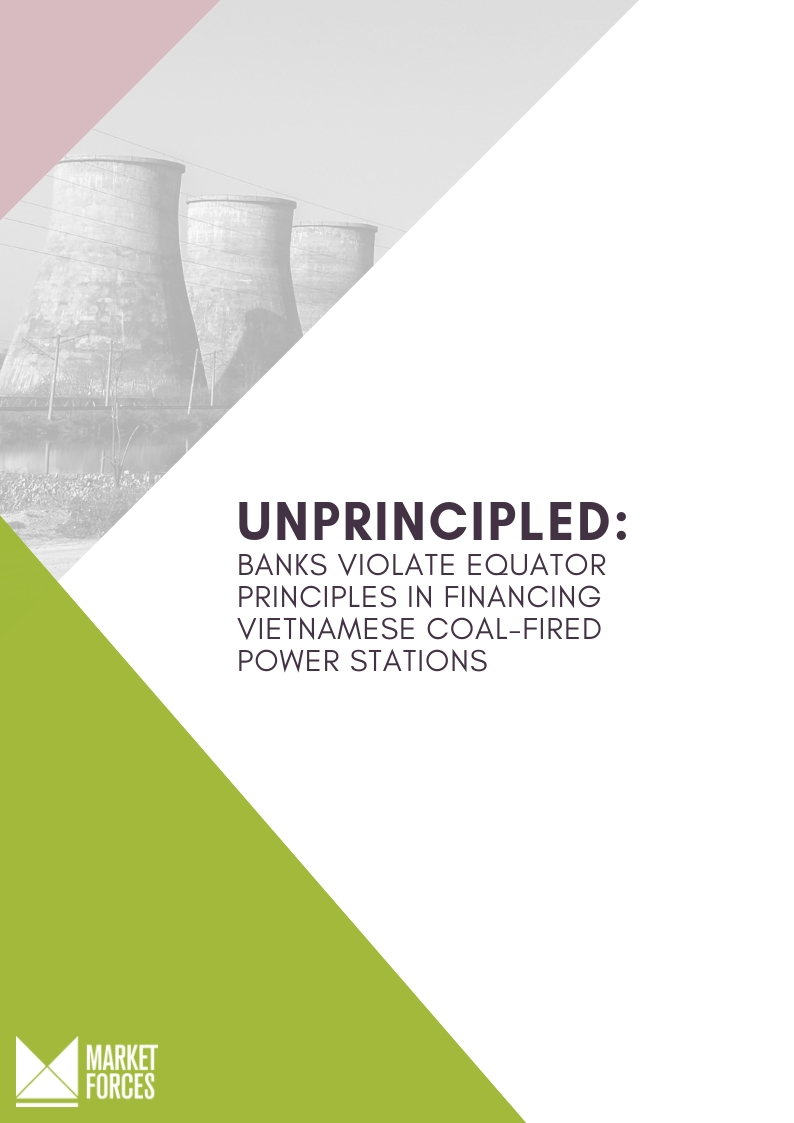2018
The Equator Principles (EPs) are a global set of voluntary standards that financial institutions sign on to – so that in financing large scale projects, they don’t harm people and the environment.
Market Forces, working with Vietnamese community organisations and other international NGOs, has found that EP signatory banks are violating those principles in their involvement in syndicates funding five Vietnamese coal-fired power stations. In doing so, they are failing the people that the principles seek to protect.
Download the full report [pdf 2.9mb]
What do these violations mean?
Here’s an explanation of how six major banks have violated the Equator Principles in the projects they’ve been involved with, and why this matters.
The banks:
- HSBC
- Mizuho Financial Group (Mizuho)
- Mitsubishi UFJ Financial Group (MUFG)
- Sumitomo Mitsui Banking Corporation (SMBC)
- DZ Bank
- Standard Chartered Bank
The projects:
| Violation | Equator Principle (EP) | Why does this matter? |
|---|---|---|
| Failure to ensure that the project sponsors disclose information key for communities to evaluate the impacts of proposed power stations, whether through Environmental and Social Impact Assessments (ESIAs) or other means. | EP 5: Stakeholder engagement | Vietnamese people who live near the projects don’t know how the project might affect them – for example: · The project might release warm water into the bay and fishing in the community may decline, affecting people’s livelihoods. · The project’s coal ash dump might be close to where people live, harming kids with asthma or leading to other respiratory illnesses. The problem is, the people around the plant don’t know the effects and the banks aren’t helping them get that information. |
| Failure to require that communities are informed and engaged by ensuring the sponsors hold public consultations and engage stakeholders at the time of the ESIA and on an ongoing basis. | EP 5: Stakeholder engagement | Vietnamese people who live around the projects aren’t being told about how the project might impact them (see above) or asked about what they need from the project. The banks aren’t helping them have a voice. |
| Failure to require compliance with Vietnamese Law on Environmental Protection: 1. No evidence of public consultation 2. ESIAs over two years old without an executed project must be repeated. | EP 3: Applicable Environmental and Social Standards | Vietnamese people aren’t being told information or asked about the project (see above), but also any information about the project that the government holds would be old. Things may have changed in years since the ESIA was completed. The banks need to make sure that up-to-date information is available so local people can make informed decisions. |
| Failure to ensure that the sponsors explore alternatives to the projects or by conducting alternatives analyses themselves. | EP 2: Environmental and Social Assessment | Without this information, Vietnamese people can’t consider whether wind or solar (great options in Vietnam) would be better from producing electricity than polluting coal. |
| Failure to demonstrate commissioning independent reviews. | EP 7: Independent Review | EP banks have to independently review the projects, not just rely on the information from the coal power developer. Vietnamese people should have the confidence that these reviews are being conducted. |
What are we doing about these violations?
The Equator Principles are far from perfect in their current form. In October 2018, over 50 of the 94 signatory financial institutions met in Washington to review them as part of an ongoing process to make much needed and long overdue changes.
According to the Equator Principles Secretariat:
“The meeting recognised that other important themes exist which were not addressed through the targeted EP4 update. Among the topics discussed were opportunities and the need to improve: transparency, disclosure and reporting; consistency in implementation; eligibility, accountability, and assurance; and grievance handling. The Steering Committee is currently considering additional efforts required around these themes and how to take them forward.”
To protect the people most affected by the Vietnamese coal-fired power projects mentioned above, it is vital that the EP signatory banks involved in these projects are held accountable for their actions.
The other 88 financial institutions have a responsibility to ensure not only that they follow the EPs themselves, but also that their fellow signatories do so.
Australia’s big four banks – ANZ, Commbank, NAB and Westpac – are all EP members.
Market Forces is calling on the big four and all other banks to pull their fellow banks into line, or risk the integrity of the Equator Principles altogether.

